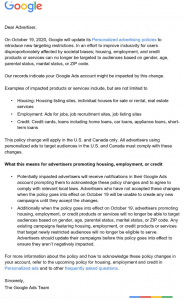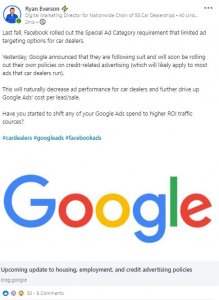- May 1, 2005
- 4,548
- 1,828
- Awards
- 12
- First Name
- Jeff
Starting October 19th 2020 Google will updates its Personalized advertising policies to introduce new targeting restrictions. No longer will you/agencies be able to target audiences based on gender, age, parental status, marital status OR zip code.
How will this effect you dealers Paid Search Campaigns?

How will this effect you dealers Paid Search Campaigns?











